

House prices in Australia are expected to see a modest increase this year despite a persistent property shortage and rising mortgage costs, according to a survey conducted by The Australian Financial Review involving 30 economists.
The median predicted rise is 2.5%, with eight respondents forecasting a decline. This contrasts with the property industry’s more optimistic view, anticipating a 4% rise.
Despite a series of cash rate hikes by the Reserve Bank, reaching 4.35% since 2022, the property market has shown resilience, with home values surging over 8% nationwide in the previous year. Analysts and financial markets widely expect that the central bank’s next move will be a rate cut, AFR reported.
Tim Toohey, Yarra Capital Management’s head of macro and strategy, observed that there seems “nothing that can break Australia’s love affair with expensive housing.”
“Falling interest rates and a large undersupply of housing suggest you would be brave to forecast a decline in prices in 2024,” he told the publication.
The four major banks projected a more bullish outlook, suggesting residential property prices could rise between 5% and 6%.
“We continue to see house prices rising a further 5%, with ongoing strength in housing demand outweighing the impact of the ongoing pass-through of higher rates,” said Alan Oster, chief economist at NAB.
Record-high net overseas migration, reaching 518,000 in the last financial year due to the post-COVID surge, has contributed to an acute rental crisis.
George Tharenou, chief economist for Australia at UBS, noted, however, that mortgage arrears have stayed “extremely low” to date, and substantial declines in home prices would only likely occur if the job market significantly weakened.
Anticipation of lower borrowing costs is driving optimism in the property market.
Prashant Newnaha, macro strategist at TD Securities, said that his projection of a 5% lift in home values was based on a modest easing of the job market and global interest rate reductions by central banks.
Analysts cautioned that the pace of gains may moderate as the economy slows and consumers feel the impact of past rate increases.
“Slower population growth and the lagged effect of previous monetary tightening will weaken demand for property, but we expect that housing supply will remain constrained, putting a floor under the extent to which home price growth slows,” Paul Bloxham, HSBC chief economist, told AFR.
Marcel Thieliant, senior economist at Capital Economics, warned that housing affordability, which he said was the most stretched since the early 1990s, portends poorly for house price growth, projecting a 2.5% increase by year-end.
While some economists anticipated a mild recovery in the second half of 2024 after potential RBA interest rate cuts, others, including KPMG, MLC Asset Management, Morgan Stanley, and Emerson Economics, have predicted flat house prices this year, citing a weakening job market.
“Given the economy is likely to barely register a pulse in early 2024 with interest rates remaining high and the jobs market softening, the affordability problem should see house prices drift lower in the opening half of 2024,” Bob Cunneen, MLC Asset Management chief economist, told AFR.
“The second half of 2024 is likely to see a mild recovery as the RBA interest rates cuts give some prospective buyers hope.”
Brendan Rynne, chief economist at KPMG, concurred with this perspective, asserting that prevailing supply and demand imbalances will bring about short-term stability in house prices, but a rebound is anticipated after the RBA lowers the policy rate later in the year.
“We expect migration rates will slow, although remain above pre-COVID, which should see rental tightness ease somewhat, while at the same time property listings will continue to rise, particularly from investors,” Chris Read, an economist at Morgan Stanley, told AFR.
A subset of economists surveyed by AFR cautioned, however, that property prices might decline by as much as 5%.
“House prices have been one of the biggest surprises in 2023 despite falling real disposable incomes and the burden of higher interest rates,” said Matthew Peter, QIC chief economist. “With the labour market expected to be meaningfully weaker over 2024, house prices may again be one of the biggest surprises of 2024, but this time, to the downside.”
Warren Hogan, chief economics adviser at Judo Bank, was the most pessimistic, predicting a 5% drop in dwelling prices Considering household income and prevailing interest rates, Hogan estimated that home prices should be 10% to 12% lower than their current levels.
Get the hottest and freshest mortgage news delivered right into your inbox. Subscribe now to our FREE daily newsletter.
